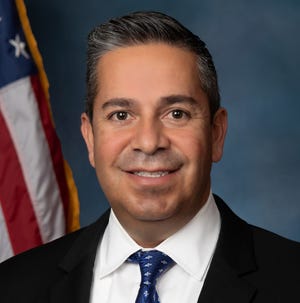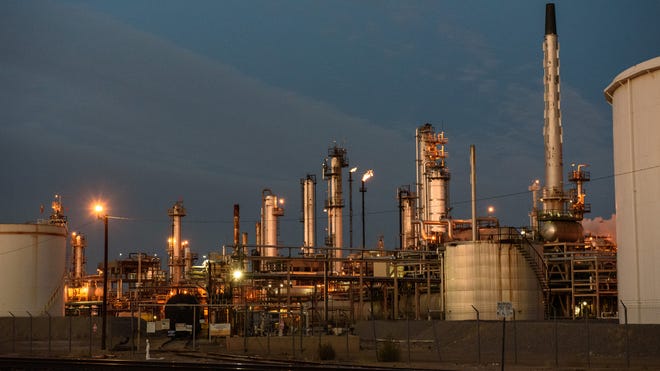President Joe Biden signaled a desire to join New Mexico’s political leaders in cleaning up abandoned oil and gas wells throughout the State and nation through appropriations in the Fiscal Year 2022 Budget Request released last week.
The budget increased funding at the Department of the Interior by about $2.5 billion for a total of $17.6 billion, including funds to address environmental issues and reform management of public lands.
Of that spending, $300 million in the proposal was earmarked to support jobs cleaning up orphan wells left unused by operators along with abandoned mines and decommissioning offshore oil and gas infrastructure.
More:Oasis Petroleum exits Permian Basin, shifts oil and gas operations to Bakken in North Dakota
In New Mexico alone, there was an estimated 700 abandoned wells and thousands more around the U.S.
Other expenditures in the budget saw $169 million for a Community Revitalization Program to fund reclamation of public lands and provide grants to states and Tribes to do so, and $249 million to increase renewable energy production.
U.S. Interior Secretary Deb Haaland, a former New Mexico congresswoman, said Biden’s budget pushed for “clean energy future” moving away from fossil fuels and other sources of pollution.
More:New Mexico’s new oil and gas emission controls take effect. What now?
“From bolstering climate resiliency and increasing renewable energy, to supporting Tribal nations and advancing environmental justice, President Biden’s budget will make much-needed investments in communities and projects that will advance our vision for a robust and equitable clean energy future,” Haaland said.
Larry Behrens, Santa Fe-based Western States Director with oil and gas advocacy group Power the Future questioned the spending proposal as promoting energy sectors such as renewables which Behrens said were unreliable.
The President’s energy policies, Behrens said, risked upending domestic fossil fuel production which he said the country relies on for jobs and economic sustainability.
More:Back to the well: How oil and gas funds political campaigns
“Unfortunately for New Mexico, Biden’s values run completely counter to our state. His priorities include spending millions in taxpayer dollars so his eco-left allies can continue to spread the lie that unreliable energy is affordable,” Behrens said.
“He’s canceling pipelines and canceling production to attack our domestic energy supplies because he knows renewable energy can’t win in a fair fight – that is no way to rebuild a fragile economy on the backend of a pandemic.”
Fight to plug wells taken up by New Mexico’s leaders
The move to plug abandoned wells in New Mexico was supported by New Mexico Gov. Michelle Lujan Grisham and the State’s Democrat congresspeople in recent months.
More:Study: Artesia’s Navajo Refinery one of the nation’s most air-polluting oil and gas sites
Lujan Grisham signed a letter to Congress in May along with 11 other governors from both sides of the aisle to support the Revive Economic Growth and Reclaim Orphaned Wells (REGROW Act) introduced by U.S. Sen. Ben Ray Lujan (D-NM).

That bill would invest $4.7 billion in plugging wells and remediating the land, with about $4 billion going to state and private lands, $250 billion to the Bureau of Land Management for efforts on federal land and $150 million to Tribes.
The need for federal funding was especially dire in New Mexico, as the State Land Office released a study that showed an $8 billion funding gap based on the cost of plugging wells in the state and available state funds to do so.
More:U.S. House bill to clean up abandoned oil and gas wells passed by committee
In the letter, the governors argued plugging wells could provide jobs to oil and gas workers struggling for work during the recent downturn in fossil fuel markets led by the COVID-19 pandemic and the U.S.’ shift toward renewable energy.
“The labor pools for natural gas and oil production and well plugging and remediating are virtually the same,” the letter read. “A health influx of well plugging projects will provide job opportunities for 10s of thousands of these workers while fast-tracking environmental restoration across the country.”
The REGROW Act also saw support from oil and gas industry leaders like the New Mexico Oil and Gas Association.
More:More Permian Basin oil headed to European markets as industry recovers from COVID-19
Robert McEntyre, spokesperson with the Association said the act would improve environmental practices and would assist states in such efforts.
“We support sound and environmentally responsible efforts to assist states in their programs to plug and remediated orphaned wells,” he said. “Bipartisan legislation, like the REGROW act, would help advance sound and environmentally responsible practices to address these sites across the country.”
But McEntyre was critical of a bill introduced by U.S. Rep. Teresa Leger Fernandez (D-NM) that would not only increase funding for plugging by about $7 billion wells but increase bonding rates companies pay to fund remediation should a well be orphaned.
More:New Mexico State Land Office sues oil and gas company for abandoned wells in Chaves County
Federal bonding requirements would be increased to a minimum of $150,000 for wells on an individual lease and $500,000 for all of an operator’s wells in a certain state.
These kinds of decisions, McEntyre said, should be left up the states to consider their own specific impacts.
“Bonding requirements, like those New Mexico updated in 2018, are best left to states to determine to meet their unique and individual needs,” McEntyre said.
More:Oil and gas tax collections nearly $3M in Eddy County
Leger Fernandez argued oil and gas companies needed to be better held accountable for abandoning wells, going beyond reactive funding for remediation as in Biden’s budget proposal, and including preventative requirements before a well is drilled.
“We cannot allow taxpayers to get left holding the bag,” she said. “This bill is a critical first step toward addressing the climate crisis and investing in our rural, legacy fossil fuel communities.”
Adrian Hedden can be reached at 575-618-7631, achedden@currentargus.com or @AdrianHedden on Twitter.







